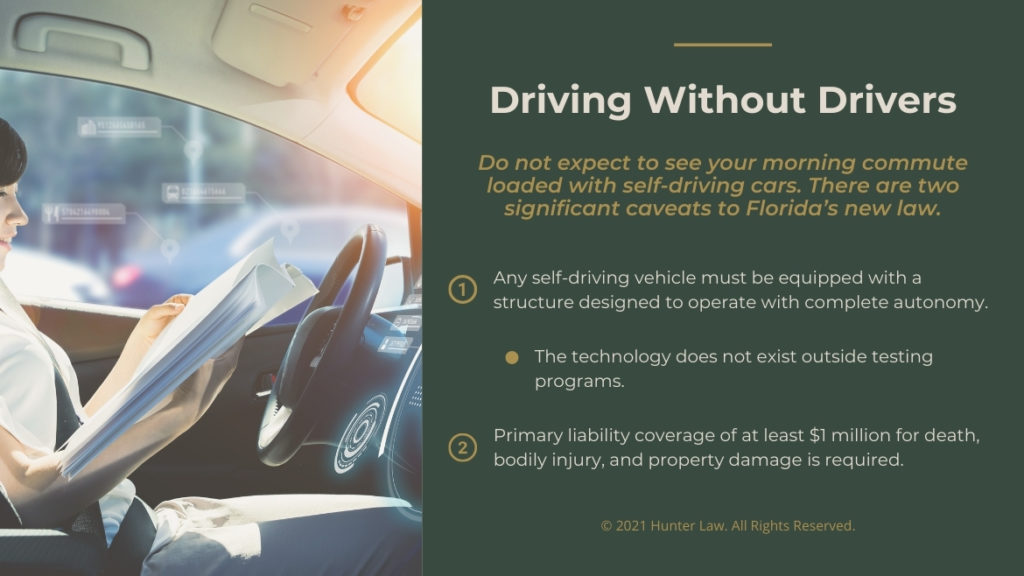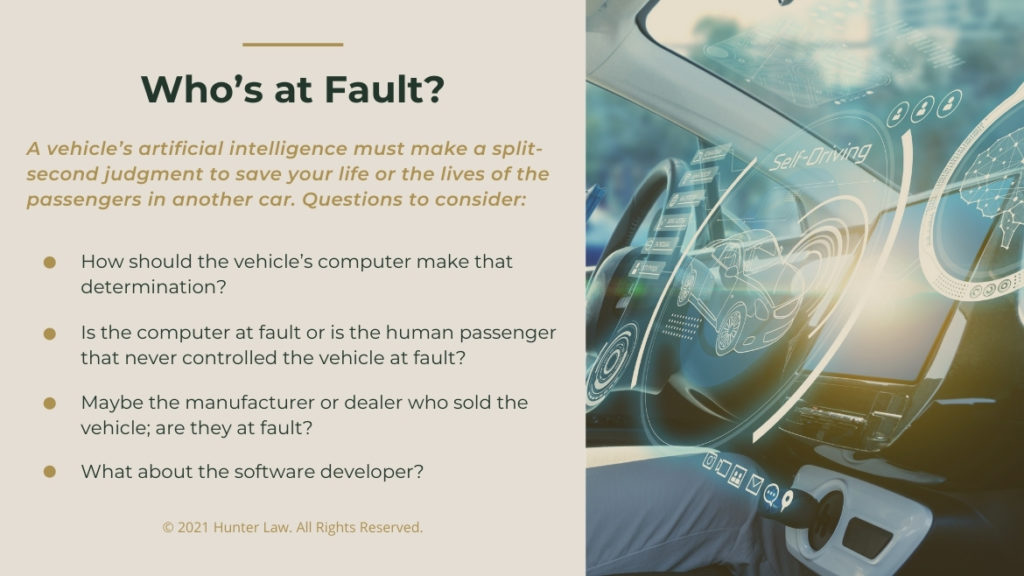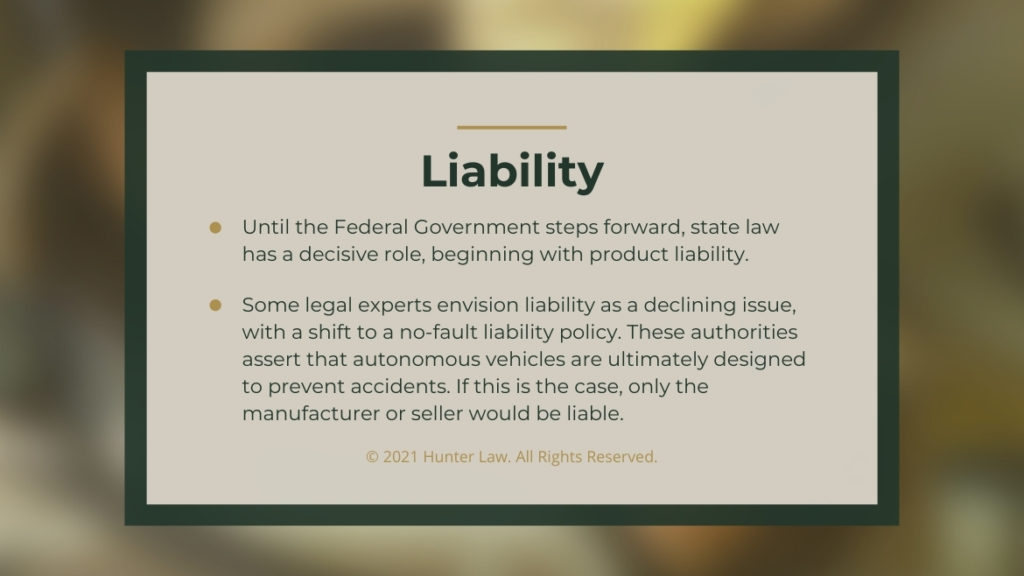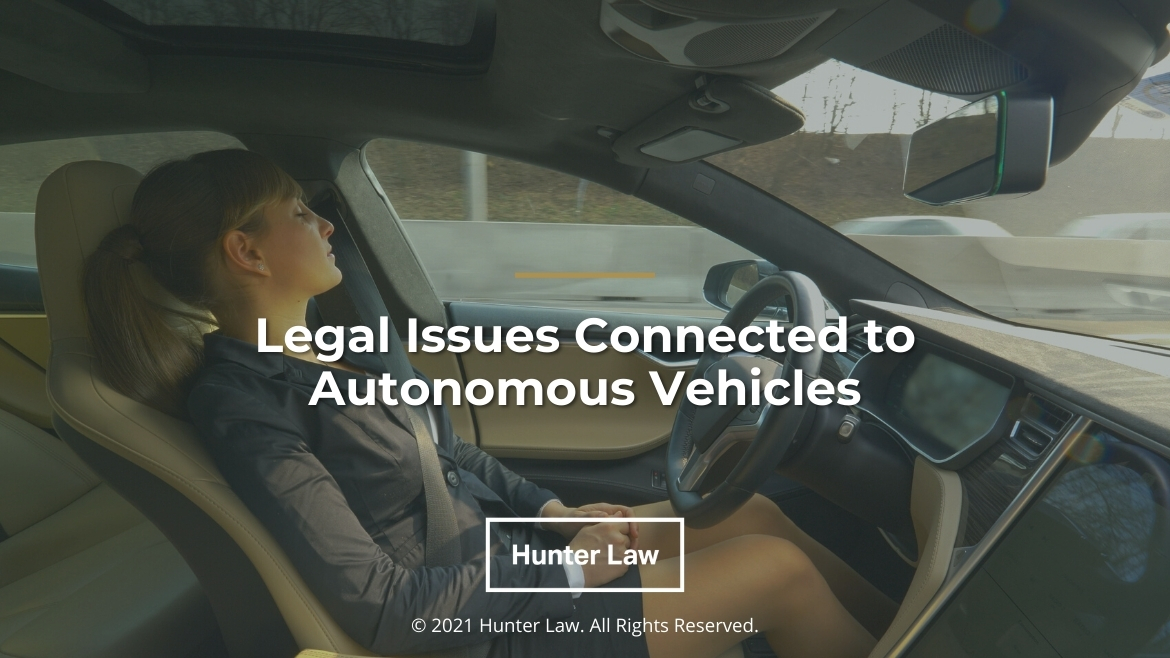Autonomous vehicles (AVs) have limitless potential. Self-driving cars can reduce accidents, drastically lower fossil fuel emissions, and give millions access to badly needed transportation. Not to mention pizza delivery.
Automotive experts agree if the future of AV comes to fruition the way it is designed, accidents and vehicle death and injury will be cut dramatically.
Technologies for autonomous driving are moving forward at frightening speeds. Every significant consortium connected to autonomous vehicles is bracing for an untold number of legal challenges.
Hunter Law Group (813) 287-2227
The Federal Government can ill afford to put off establishing autonomous vehicle law any longer. Manufacturers and sellers cannot invest the massive funds required to deploy an autonomous vehicle and then pull a fleet at the first accident.
Most companies involved in the technology, such as Lyft and Uber, are taking a calculated approach to full deployment. Any premature vehicle rollout could destroy public confidence in the company and involve them in costly liability litigation.
Autonomous vehicles are an exciting part of the world’s future. Technologies are progressing rapidly, with cars sensing their surroundings and safety taking the front seat. Infrastructure around the world is being built with self-driving cars as a centerpiece.
Our post on the coming legal concepts for self-driving vehicles is only the beginning of this compelling subject. The legal community will play an essential role in the coming decades.
- Driving Without Drivers
- Who Is at Fault
- Liability
- Final Word

Driving Without Drivers
On June 13, 2019, Gov. Ron DeSantis of Florida signed CS/HB 311, clearing away obstacles hindering autonomous vehicle technology advancement. Florida Statute 316.85 says a licensed human operator is not required to operate a fully autonomous vehicle.
The Skillful Attorneys at Hunter Law can protect you and your family in the event of an accident. Before talking to authorities or speaking to any insurance company, call our offices immediately at (813) 287-2227
Do not expect to see your morning commute loaded with self-driving cars. There are two significant caveats to Florida’s new law.
- Any self-driving vehicle must be equipped with a structure designed to operate with complete autonomy. This caveat describes a Level 4 or 5 self-driving vehicle. The technology does not exist outside testing programs.
- 2020 Florida Statutes, Chapter 627 says, Primary liability coverage of at least $1 million for death, bodily injury, and property damage is required.
In reality, Florida’s new law will have a limited impact on the growth of the technology, although it clears the way for self-driving cars when the technology is sufficiently advanced.
Who Is at Fault?
A vehicle’s artificial intelligence must make a split-second judgment to save your life or the lives of the passengers in another car.
Questions:
How should the vehicle’s computer make that determination? If the accident occurs, is the computer at fault or the human passenger that never controlled the vehicle? Maybe the manufacturer or dealer who sold the vehicle; are they at fault? What about the software developer? Negligence relating to the hypothetical accident opens up several more questions.
Hunter Law (813) 287-2227
Thorny issues from above are just a tiny sampling of what the legal community faces in the not too distant future. Our legal process will be called on to iron out policy and understand how autonomous technologies operate at their core.
Our society has just begun to consider the implications of autonomous vehicle technology and connected legislation. Without broad case law as a precedent and in the absence of Federal action, there is great uncertainty regarding potential legal challenges.
When faced with the challenges that arise from an accident you and your family deserve the best representation possible. Hunter Law is the office you need to call at (813) 287-2227.
In 2020, 37 states had passed laws dealing with autonomous vehicles. State courts will likely set new laws from prevailing rules and regulations, with a few adjustments.
A sampling of Current Federal Autonomous Vehicle Activity:
- NHTSA has begun laying its foundation
- USDOT is laying the foundation for safety
- Enacted legislation for Autonomous Vehicles from the US Legislature
- America leading the technology race

Autonomous Vehicles and Liability
At present, Federal Preemption looms over every aspect of the legal liability issue. Until the Federal Government steps forward, state law has a decisive role, beginning with product liability.
If you have been hurt in an accident, contact the experienced personal injury team at Hunter Law (813) 287-2227
The preparation for Federal Preemption has been established in two specific cases.
- Geier v Honda held the federal safety standard pre-empted stricter state law.
- Williamson v Mazda Motors states NHTSA does not preempt state tort lawsuits against auto manufacturers from injuries due to the lack of a particular type of seat belt.
Some legal experts envision liability as a declining issue, with a shift to a no-fault liability policy. These authorities assert that autonomous vehicles are ultimately designed to prevent accidents. If this is the case, only the manufacturer or seller would be liable.
The US Government is proceeding with caution to produce a regulatory framework that will avoid suppressing the technology and understand roadway use and testing requirements. Until there is an extensive federal policy, traditional state tort and warranty will control civil liability involving accidents in the AV space.
Cybersecurity
From the outset, AV manufacturers must recognize and deal with the increasing concerns of cybersecurity. Any AV builder, dealer, or third party who does not take cyber-attacks seriously is doomed for failure. Ransomware and malicious-code attacks are becoming mundane headlines due to their frequency around the globe.
If a cyber attacker infiltrates the base operational code of an automobile, catastrophe could be inevitable.
Hunter Law Group (813) 287-2227
Plaintiffs in a California civil liability case alleged Toyota had technology susceptible to hacking. The court dismissed the case. However, the action led to California’s IoT law, which requires manufacturers of connected devices to have reasonable security features.
Hunter Law is your East Coast answer to the same questions of how vehicles and susceptible technology may be impacting your life.

Data Privacy
Big Data will fundamentally impact traditional litigation and remodel the automotive trade in ways we cannot imagine. According to Mckinsey & Company, seven years ago, the market for connected devices on automobiles, such as sensors and cables, was valued at $30 billion. In 2020, the same market grew to $215 billion. Industry experts maintain that specific core markets could double or triple in value with the coming AV revolution.
Data privacy concerns everyone. Industry officials report that a single self-driving vehicle is expected to generate and consume 40 terabytes of data every eight hours driven. To put this number in context, the Library of Congress holds 15 terabytes of data.
The enormous volumes of information and its significance to the AV industry raises several fundamental legal issues.
- What data is permissible to collect by manufacturers, sellers, or developers? How much data is too much?
- Who owns your vehicle’s data, the manufacturer, governments, or you? If someone other than you controls your vehicle’s data, can they monetize (sell to third-party vendors) the information? Under what circumstances?
- Who is responsible and capable of storing and protecting the massive amounts of data that will be produced?
Regardless of who owns the data or how it will be shaped, an enormous collection of liability precedents will be required.
Final Word
The future of autonomous vehicles and their applications are bright. However, the sheer volume of data and ambiguities from the Federal Government make the road bumpy for everybody.
Tampa, Florida has thousands of companies that will directly benefit from AV technology; from food delivery to ride-sharing. If you need answers to personal injury questions, help is just a phone call away. Hunter Law (813) 287-2227 is here to skillfully help you through each step of the process.
No connected group in the sphere of influence will be tasked with as much responsibility as the legal profession. From state decisions to federal directives, law firms worldwide and Hunter Law here in Florida, have their work cut out.


